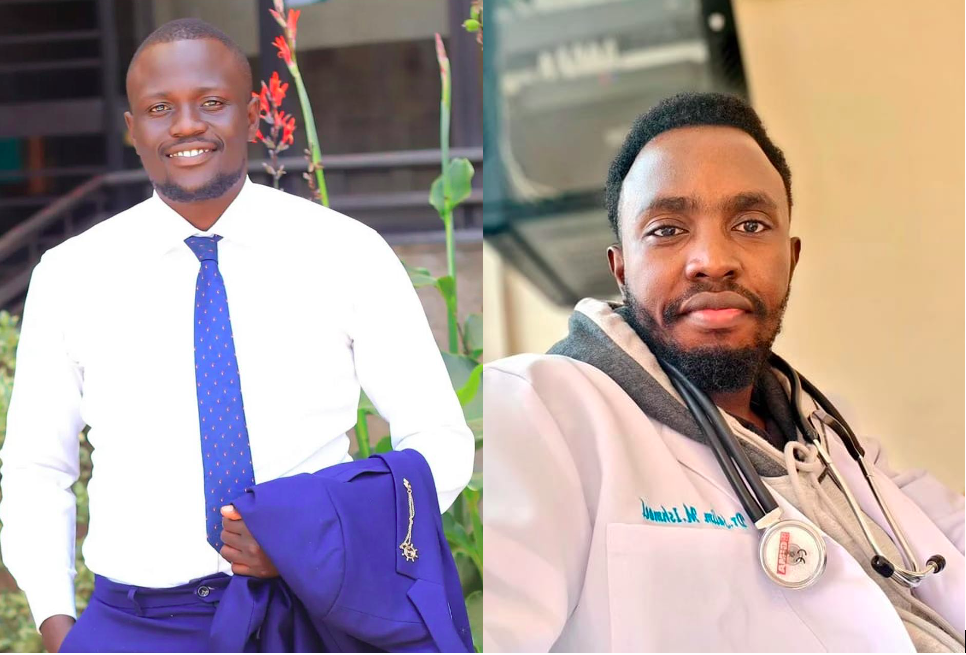
Amidst billowing teargas and the chaos of dissent during the Gen Z protests earlier this year, two young medics emerged as unexpected heroes.
Dr Salim Ishmael, 28, and his colleague, Dr Austin Omondi (popularly known as Japrado), 27, galvanised a nationwide movement of healthcare workers to provide life-saving care to those injured during protests against excessive taxation. Their initiative, Medics For Kenya, has now earned them a nomination for The Star’s Persons of the Year.
“We didn’t plan for it to grow this big,” Dr. Ishmael confesses. “After the first Tuesday of protests on June 18, Austin and I connected on Twitter. We both had the same idea—to do something. Within no time, we mobilized around 1,000 people nationally, from consultants to medical students.”
The protests were driven by young Kenyans fed up with rising taxes, particularly those contained in the Finance Bill 2024. As clashes between police and protesters turned increasingly violent, injured civilians found themselves with few options for care. Public hospitals, already overburdened, were overwhelmed. This gap in services was where Medics For Kenya made its mark.
“We set up medical camps in Nairobi, Mombasa, Kisumu, Nakuru, and Nyeri,” says Ishmael. These camps functioned as makeshift trauma centres, staffed by volunteers—including doctors, nurses, clinical officers, paramedics, and medical students. “We had team leads and regional leads in each location. Everyone involved was licensed by their respective medical councils, and care was delivered with the utmost professionalism.”
By August, Medics For Kenya had treated 700 patients suffering from gunshot wounds, fractures, asthma attacks triggered by teargas, and lacerations from police batons. Severe cases were stabilized and referred to major hospitals like Kenyatta National Hospital. “We unburdened KNH and other hospitals in the process,” Ishmael notes.
Running such a large operation in politically charged circumstances was not without its challenges. Medics often worked under the looming threat of violence and surveillance. “Security was a constant problem,” Ishmael says. “We were teargassed while treating patients. At one point, someone tried to steal our data. And then there were the abductions.”
He pauses, recalling the darker moments. “I almost got abducted myself. Dr. Omondi wasn’t so lucky—he was taken by security agents but later released. Phones were tapped, and volunteers were threatened.
Dr Omondi says his abduction did not deter him but it instead inspired him to do more.
"Afterwards there was no significant threats or intimidation towards me. What drives me in the work I do is the fact that we have many gaps in healthcare in Kenya," he said.
"I would like to do my part to fill these gaps. For instance, the need for blood in hospitals is growing but we don’t donate enough. Blood donation needs to be part of our culture. We need a system where if you have a patient in Nairobi, you do not need to travel here to donate. You should be able to donate in Mombasa and that will be acknowledged."
Omondi said they were able to collaborate with Red Cross Kenya, Amnesty and other major organisations.
"Once we register as a non-profit, we would like to deepen these collaborations to strengthen our work in Kenya," he said.
While the immediacy of the protests has subsided, Medics For Kenya continues its work. “We’ve done six more medical camps post-protests,” Ishmael says. Their initiatives now include a massive blood donation drive, conducted in partnership with the Red Cross and the Kenya Tissue and Transplant Authority. “We collected 800 liters of blood, the largest in Kenya’s history,” he adds.
The team has also addressed menstrual health by distributing year-long supplies of sanitary pads to 1,000 girls. These efforts speak to their broader mission, which Ishmael and Austin hope to formalise as a registered NGO. “Once we’re registered, we want to focus on three areas: providing emergency medical services, championing the rights of medics, and offering humanitarian aid.”
For Ishmael, the most rewarding aspect of their work has been the lives they’ve saved and the hope they’ve inspired. “We didn’t just treat injuries,” he says. “We showed people that they are not alone, that there are Kenyans who care.”
As he reflects on the challenges, his voice remains steady, but there’s an undertone of frustration. “We didn’t always have supplies as quickly as we needed. And getting everyone home late at night was tough. But the generosity of Kenyans kept us going.”
Their Medics For Kenya has been described as Kenya’s largest "virtual hospital," not only because of its scale but because it embodies the power of collective action.
Dr Ishmael and Dr Omondi’s nomination is a well-deserved recognition. Yet for Ishmael, the real reward lies in the trust and gratitude of the people they served. “This is just the beginning,” he says with quiet determination. “There’s so much more we can do.”

